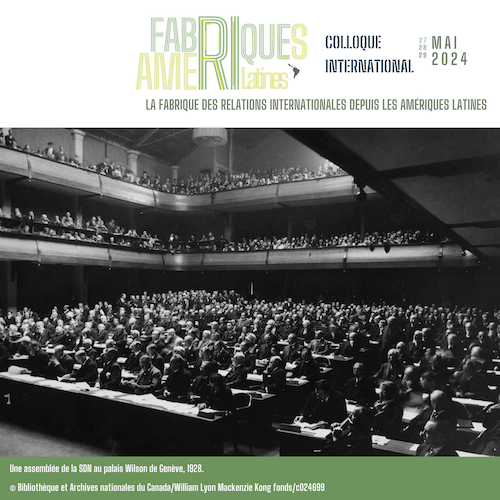Table 1
"International organizations and
reconfigurations of multilateralism"

The 20th century witnessed the birth of numerous institutions aimed at promoting multilateralism. The League of Nations emerged after World War I, succeeded by the United Nations in the second half of the century, while on the scale of the Americas, Pan-Americanism also attempted to take shape in various arenas. The idea of running international relations on a global scale through multilateral organizations that linked different countries became increasingly contemplated as a viable solution by its founding states. What new world order initiatives do these institutions pursue? While they aim to break the dominance of major powers over global decisions, do these institutions truly manage to include so-called peripheral and smaller countries, or are they merely spaces for meetings and decision-making favorable to the interests of the world's major powers? Therefore, the discussion will revolve around questioning the effectiveness of these initiatives in rebalancing power relations between states in the 20th century, as well as analyzing the role that Latin American states can play within them and measuring their degree of agency, especially in relation to the United States.
***
Moderation
Élodie Lenoël [USN, CREDA]
Discussion
Jean-Michel Guieu [Université Paris 1 Panthéon, SIRICE]
Speakers
Chloé Maurel [SIRICE, INALCO]
The Growing Ascendancy of Southern Countries within the UN, its agencies, and other international organizations.
Since 1960-62 and the accession of around twenty newly independent African countries to the UN and its specialized agencies, Southern countries, grouped within the G77 and UNCTAD, have actively sought to coordinate among themselves and to be heard more, exerting more influence in these organizations long centered on the West. How has this ascendancy occurred and what configuration has it reached today, within the UN and its agencies, but also within other international organizations, and with what consequences, impacts, results, on international relations?
***
Juan Pablo Scarfi [CONICET, Universidad de San Andrés]
The Latin American "invention" of multilateralism: The legacy of Pan-Americanism and the institutionalization of the Inter-American System in the 1930s and 1940s
Although the Inter-American System, associated in its origins with Pan-Americanism, has tended to be considered as the friendly face of US hegemony in Latin America, Latin American countries played a decisive role in the construction of inter-American multilateralism in the 1930s and also global multilateralism of the 1940s. As shown in this paper, in a long process that culminated in the Montevideo Pan-American Conference (1933), Latin American states reconfigured the Inter-American System, structured around US hegemony and Pan-Americanism, and "invented" inter-American and global multilateralism of the post-1945 international order, consolidating the principle of non-intervention and the norm that great powers, such as the USA, had duties and rights to respect the sovereignty and territorial integrity of weak states.
***
Thomas Fischer [Katholische Universität Eichstätt]
Latin American delegates in the League of Nations
The figure of the delegate in the history of international politics has never been examined in detail. Delegates are defined as representatives of states in my paper on the representatives of Latin America in the assemblies of the League of Nations. They were chosen by the governments of the countries they represented to defend national interests as defined by the ruling elites in Geneva. The Latin American delegates were predominantly "white", male, diplomatically experienced and over 50 years old. In their physical practices, they resembled European diplomats. My research shows that they can be categorized into the following "types": 1) "diplomats"; 2) "writers and humanities scholars"; 3) "politicians"; 4) "businessmen". These diplomats wanted to use the League of Nations as an arena and platform to represent national interests in the global competition between nations dominated by empires. The formal criterion of the equality of states ("one state, one vote") helped them in this. Latin American delegates were sometimes quite successful due to their foreign language skills and their knowledge of international law, diplomatic practices and negotiating styles. They intervened in agenda-setting at conferences, in the assemblies and in committees and used their arguments to influence the negotiation of individual topics and the adoption of resolutions. In doing so, they put themselves in the limelight and thus managed to be noticed by other delegates, professional journalists and the general public.
***
Selectives bibliographies
Compagnon, Olivier, América Latina y la Gran Guerra: El adiós a Europa (Argentina y Brasil, 1914-1939), Buenos Aires, Crítica, 2014.
Dumont, Juliette, Diplomaties culturelles et fabrique des identités. Argentine, Brésil, Chili (1919-1946), Rennes, Presses Universitaires de Rennes, 2018.
Long, Tom, “Latin America and the liberal international order: an agenda for research”, International Affairs 94, No 6 (2018), 1371–1390.
Long, Tom ; Schulz, Carsten-Andreas, “Republican internationalism: the nineteenth-century roots of Latin American contributions to international order”, Cambridge Review of International Affairs 35, no. 5 (2022), 639-661.
Rodríguez, J. Luis ; Christy, Thornton, “The Liberal International Order and the Global South: A View from Latin America,” Cambridge Review of International Affairs 35, no. 5 (2022): 626-638.
Scarfi, Juan Pablo, The Hidden History of International Law in the Americas: Empire and Legal Networks, Oxford, Oxford University Press, 2017.
Scarfi, Juan Pablo, El imperio de la ley: James Brown Scott y la construcción de un orden jurídico interamericano, México, Fondo de Cultura Económica, 2014.
Scarfi, Juan Pablo ; Sheinin, David (dir.), The New Pan-Americanism and the Structuring of Inter-American Relations, Routledge, 2022.
Scarfi, Juan Pablo ; Tillman, Andrew (dir.), Cooperation and Hegemony in US-Latin American Relations: Revisiting the Western Hemisphere Idea, Palgrave Macmillan, 2016.
Scarfi, Juan Pablo, “The Latin American politics of international law: Latin American countries’ engagements with international law and their contradictory impact on the liberal international order”, Cambridge Review of International Affairs 35, no. 5 (2022): 662-679.
Thornton, Christy, “Establishing the limits of the liberal international order: Latin America and the demand for development,” Cambridge Review of International Affairs 35, no. 5 (2022): 680-697.
***


